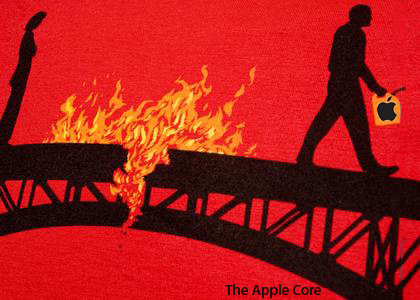How Apple's bridge burning hurts customers

Is Steve Jobs off his meds?
In two short months the Apple CEO has publicly humiliated and belittled two of the biggest titans of technology, Adobe and Google. He called Google's do no evil motto "B.S." and called Adobe "lazy" and its Flash technology "buggy." And it gets worse, since his initial slams against Adobe and Google, Apple has gone on a jihad against Flash, condemning it at every turn as a crash-prone, resource hog.
I don't know about you, but I think that Jobs could use a refresher course in corporate diplomacy.
Apple took it up a notch and completely banned the use of cross-compilers (i.e the Flash-to-iPhone compiler in Flash Professional CS5) in the iPhone 4.0 beta SDK, which may have been the last straw for Adobe. Adobe’s product manager for the Flash platform, Mike Chambers, said in a blog post (via BTL) that the company will halt future development on Flash apps for the iPhone/iPod/iPad. Chambers maintains that Apple’s new terms single out Adobe and content created with Flash CS5.
The primary goal of Flash has always been to enable cross browser, platform and device development. The cool web game that you build can easily be targeted and deployed to multiple platforms and devices. However, this is the exact opposite of what Apple wants. They want to tie developers down to their platform, and restrict their options to make it difficult for developers to target other platforms.
...to which Apple responded:
Someone has it backwards... It is HTML5, CSS, JavaScript, and H.264 (all supported by the iPhone and iPad) that are open and standard, while Adobe’s Flash is closed and proprietary.
Will there be fallout from Apple's burning bridges with both Adobe and Google? Is Apple's megalomaniac CEO and its exclusive walled garden starting to hurt customers? The answer to both questions is yes.
Without the ability to browse Flash applications on its mobile devices Apple customers are missing content on 85 percent of top 100 Web sites. Without Google's cooperation, Apple's Maps application will continue to wither (witness the crippled iPad offering) and we'll never see powerful and free apps like Google Maps Navigation, Listen, Shopper, Goggles and SkyMap for Apple's iDevices. Instead Apple customers get crummy Weather and Stocks apps, which can’t be removed.
ZDNet's Larry Dignan notes that Adobe may have found a more willing dance partner in Research in Motion:
Add it up and you’re going to have Adobe-Android-RIM on one axis and Apple’s iPhone on the other. The game isn’t over, but those iPhone dreams are for Adobe’s Flash.
Apple's attitude of entitlement is off-putting at best and incendiary at worst. It's one of the many reasons why over 500+ commentors and 68% of 8,000 respondents think that Apple is smug and arrogant. While I understand the argument about how Flash can be power-hungry and that Google's open OS isn't everyone's cup of tea, does Apple need fight its battles so publicly? Apple needs to settle into its role as a technology leader and innovator and not throw its weight around so wildly.
A colleague once explained it to me like this: The reason that a house cat doesn’t eat you is because it’s smaller than you. A bigger cat (take for example, a Snow Leopard) will eat you. Apple used to be a small, friendly cat but has since grown into a much bigger cat - and it's starting to eat people.

"Should I call my publicist or do you want to call yours?"
Make no mistake about it, despite Jobs and Google CEO Eric Schmidt's (probably staged) coffee talk Apple's relationships with Adobe and Google are frostier than ever, and it's Apple's customers that lose out in the end.
Photo: AskMissA.com and Gizmodo
